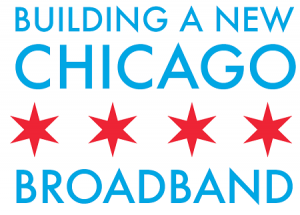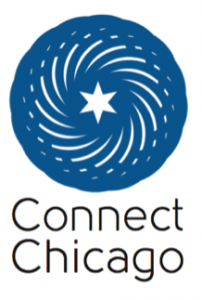 Earlier this week, Mayor Rahm Emanuel announced the Chicago Broadband Challenge, “a unique initiative that will engage the public to secure Chicago’s position as one of the digital capitals of the country and the city with the greatest availability of ultra-high-speed broadband in the United States.”
Earlier this week, Mayor Rahm Emanuel announced the Chicago Broadband Challenge, “a unique initiative that will engage the public to secure Chicago’s position as one of the digital capitals of the country and the city with the greatest availability of ultra-high-speed broadband in the United States.”
The initiative includes a Request For Information that will help drive three main goals:
The City of Chicago is releasing a Request for Information (RFI) today, that seeks to engage private companies, universities, and other organizations to accomplish three main goals: building world-class broadband infrastructure for the city; extending broadband service into underserved areas; and providing free Wi-Fi access in public spaces throughout Chicago.
In driving the building of this infrastructure, the City will first focus on establishing an open, gigabit-speed networks in key innovation areas. The City has identified 15 innovation zones in key commercial and industrial corridors, and will work with the private sector to leverage the existing infrastructure and assets to ensure low-cost broadband is available in these zones with the ultimate goal of extension to all businesses in the City. The City will accomplish this by launching the RFI, and working with private sector service providers to determine best practices and innovative solutions that will allow the low-cost broadband to be developed.
The second goal of the RFI is to expand access to high-speed internet for residents who live in underserved and disadvantaged neighborhoods. Respondents to the RFI will be encouraged to bring solutions forward that will expand access and availability for these communities throughout the city. The City will additionally work with partners like the Smart Chicago Collaborative to develop a comprehensive strategy for digital skills training to ensure that Chicagoans can make the most of broadband access.
Finally, the third element of the RFI will be to implement free Wi-Fi internet service in every public park, plaza or space across the city. The City will start by offering free Wi-Fi in Millennium Park in September, as part of a partnership with SilverIP. This effort will expand to include every public space in the city over the next several years. The RFI will solicit private sector companies, non-profit organizations and other groups that can participate in establishing this connectivity.
Smart Chicago is excited to be a part of this process. We were founded to help address issues of uneven access to the Internet and harness its transformative power to change lives. The amazing work done by our partner LISC Chicago in their Smart Communities program is a powerful demonstration of the value of increasing digital access and use by families, businesses and other institutions. I’ve seen these programs up-close— they are changing lives for the better by teaching youth how to use new media, helping small businesses use technology to grow, and helping neighborhood residents connect to information and services.
 Smart Chicago is also working with the Chicago Public Library, Department of Family Support Services, City Colleges of Chicago, Chicago Cook Workforce Investment Council, and Chicago Housing Authority to strengthen their existing computer training and pull it into a cohesive program. The lessons we’re learning in the course of our Digital Skills Initiative and Connect Chicago campaign are informing this comprehensive strategy for digital skills training.
Smart Chicago is also working with the Chicago Public Library, Department of Family Support Services, City Colleges of Chicago, Chicago Cook Workforce Investment Council, and Chicago Housing Authority to strengthen their existing computer training and pull it into a cohesive program. The lessons we’re learning in the course of our Digital Skills Initiative and Connect Chicago campaign are informing this comprehensive strategy for digital skills training.
I’ve written before about the importance of gigabit-speed connectivity here in Chicago— here’s a primer on the organizations and projects that are working on the Federal level to make that happen. A key point is importance of new ideas for the use of ultra-high-speed broadband— there is currently a lack of solid ideas on what we’d *do* with gigabit speeds.
We need the voices of all Chicagoans to make this initiative work for all of us. The Broadband Challenge website seeks your input on the following key questions:
How the City can best make use of its existing broadband infrastructure and potential uses for future expansion of high-speed broadband access citywide. So let’s fill-in-the blank here:
- “If I had ultra-high-speed broadband at home I could….”
- “If my school/church/community group had blazing fast internet service we could…”
- “If my company had gigabit speed fiber we could…”
To submit your thoughts on how best to address Chicago’s Broadband Challenge, send your answers to these questions to chicagobroadband@cityofchicago.org.
By Ameet Sachdev, Tribune staff reporter, 10:59 a.m. CDT, September 24, 2012
Emanuel said his first goal is to build a network infrastructure that will offer Internet service at “gigabit” speeds, which are about 100 times faster than a basic cable modem. Google built such a network in Kansas City, Mo., that bypassed the local cable and phone companies.
While Google is selling its broadband service to consumers, Emanuel would like to focus the ultra-fast connections in commercial and industrial areas, what he called “innovation zones.”
The mayor also acknowledged that faster Internet service is needed in Chicago’s disadvantaged neighborhoods.
Chicago aims for Internet access in parks, underserved neighborhoods
BY FRAN SPIELMAN City Hall Reporter/ fspielman@suntimes.com September 24, 2012 10:08AM
Now, Emanuel is launching, what he calls the “Broadband Challenge,” by dividing the city into 15 “innovation zones in key commercial and industrial corridors” and asking private sector partners to suggest ways they can “leverage the [city’s] existing infrastructure and assets” to bring low-cost, high-speed Internet to all businesses in those areas and, ultimately to underserved communities and to every park and public plaza in Chicago.
In the request for information, the city raises the possibility of making a $30 million investment in the city high-speed Internet system.
“To further these goals, the city may offer a variety of supporting assets, including: access to existing city-owned fiber; right-of-way access to [underground] freight tunnels, water mains and sewers; coordination with planned city construction work to modernize the water and sewer infrastructure; up to $30 million in IT [information technology] spending by the city and its sister agencies and other forms of investment,” the document states.
City unveils plan for free Wi-Fi, wider super-fast Internet
Greg Hinz on Politics, September 24, 2012
But those services are lacking in surrounding neighborhoods such as the Randolph Market area in the West Loop, where startup companies can find cheap rents. And even rudimentary, home-based links are not affordable in many low-income neighborhoods.
To solve that, Mr. Emanuel is issuing a request for information for companies and groups interested in coming up with potential solutions. As bait, the city said it’s willing to explore how it “can best make use of its existing broadband infrastructure and potential uses for a future expansion.” Once those ideas come in, the city would formally seek partners through a traditional bidding process.
Probably the most promising is the city’s hope to lure providers of gigabit speed out to the neighborhoods, particularly areas that house higher education institutions. Such providers offer service 50 times the speed of a typical home broadband link, and where competition exists at costs of $1,500 a month, half the price in areas without competition.
Chicago mayor targets affordable gigabit broadband, free WiFi throughout city parks
By Zachary Lutz, Endgadget, posted Sep 25th 2012 10:38AM
In addition to the hopes for ultra-fast broadband, Emanuel’s project, dubbed the Chicago Broadband Challenge, also seeks to extend low-cost, high-speed internet to underserved areas of the city and to bring free WiFi access to all public spaces such as parks and plazas. Although mostly a token gesture, mayor Emanuel announced the immediate availability of free WiFi in Chicago’s Millennium Park. The city is currently soliciting plans and proposals of how to approach the ambitious project, and you’re invited to become a bit more familiar with these grand ambitions with the PR and source links below.